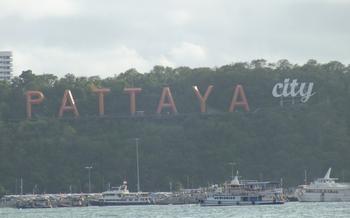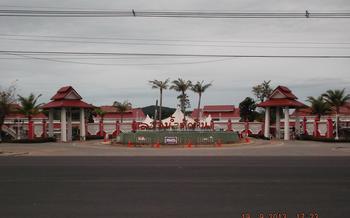
Baan Bat Community
- Orientation
- Unique Selling Points
- Baan Bat's History
- Immersion in the Community
- Handicraft Workshops
- Sustainable Tourism Practices
- Baan Bat's Impact
- Ethical Considerations: Respectful Interactions and Cultural Sensitivity
- Accommodation Options
- Food and Cuisine
- Local Transportation
- Activities Beyond Workshops
- Language and Communication
- Etiquette and Customs
- Insider Tip:
Orientation
Discover the vibrant Baan Bat community, a hidden gem nestled in the heart of Bangkok. Immerse yourself in the rich tapestry of Thai culture as you wander the labyrinthine alleys, adorned with intricate street art and vibrant murals. Delve into the fascinating history of the community, dating back generations, where families have passed down traditional craftsmanship techniques for centuries. Baan Bat's cultural significance shines through in every aspect of its daily life, from the intricate handicrafts crafted by local artisans to the melodious sounds of traditional music that fill the air. Prepare to be captivated by the warmth and hospitality of the local people as you embark on an unforgettable journey through the heart of Bangkok's hidden gem.
Unique Selling Points
Baan Bat's allure extends beyond its rich history and cultural significance. It represents a unique model of ethical tourism that offers visitors an immersive and authentic experience while simultaneously supporting the preservation of traditional crafts and empowering the local community. The village's commitment to sustainability and fair trade practices ensures that tourism benefits the community without compromising its natural and cultural heritage.
Ethical Tourism Initiative
Baan Bat operates as an ethical tourism initiative, prioritizing the well-being of the community and the environment. Tourism revenues are invested back into the village, supporting community development projects, education, and healthcare initiatives. Visitors are encouraged to engage with locals respectfully and to contribute to the preservation of local traditions and culture.
Authentic Cultural Experience
A visit to Baan Bat offers travelers an authentic glimpse into traditional Thai culture and way of life. Visitors can immerse themselves in the daily rhythms of the village, interact with locals, and learn about their customs and traditions. The village showcases traditional Thai architecture, cuisine, music, and dance, providing visitors with a comprehensive understanding of Thai culture.
Hands-on Activities
Baan Bat's hands-on activities allow visitors to engage with local artisans and learn traditional crafts firsthand. Visitors can participate in workshops to create their own handmade souvenirs, such as weaving, pottery, wood carving, and jewelry making. These workshops provide a unique opportunity to connect with the artisans, learn about their skills, and contribute to the preservation of traditional crafts.
Baan Bat's History
Baan Bat was founded by a group of villagers who were determined to preserve their traditional way of life. In the 1970s, the Thai government began to promote tourism in the region, and many villagers were forced to sell their land to developers. However, a group of villagers decided to band together and create a community where they could continue to live and work according to their traditions.
Over the years, the village has evolved and grown. New houses have been built, and new workshops have been opened. The community has also become more involved in tourism, and visitors from all over the world now come to Baan Bat to learn about and experience traditional Thai culture.
Tourism has played a vital role in the development of the Baan Bat community. It has provided the villagers with a source of income, and it has helped to raise awareness of their unique culture. The villagers of Baan Bat are proud of their heritage, and they are grateful for the opportunity to share it with the world.
Immersion in the Community
Witness the rhythm of daily life in Baan Bat.
Immerse yourself in the warmth and tranquility of Baan Bat's daily life. Observe the locals as they go about their daily routines, tending to their farms, crafting exquisite handicrafts, and preparing delicious meals. Engage in conversations with the friendly villagers, learn about their customs and traditions, and share stories of your own. Each interaction unveils a deeper understanding of their way of life and the rich cultural heritage that defines this community.
Forge meaningful connections with the locals.
The people of Baan Bat are renowned for their hospitality and openness. They warmly welcome visitors into their homes, offering a glimpse into their lives and sharing their stories. Take the opportunity to connect with them on a personal level, learn about their hopes and dreams, and share your own experiences. These genuine interactions create lasting bonds and memories that extend far beyond your time in Baan Bat.
Gain hands-on experience working with skilled artisans.
Participate in hands-on workshops led by skilled artisans who patiently guide you through the intricate processes of creating traditional crafts. Learn the art of weaving, pottery, wood carving, or batik dyeing under their expert tutelage. As you work alongside these talented individuals, you'll gain not only technical skills but also a deeper appreciation for the time-honored traditions that they uphold.
Handicraft Workshops
Baan Bat's claim to fame lies in its handicraft workshops, where visitors can delve into the intricacies of traditional Thai crafts, learning from skilled local artisans who have mastered their craft over generations. These workshops offer a unique opportunity to immerse oneself in the creative process, gaining hands-on experience in crafting beautiful and intricate souvenirs to cherish as mementos of one's time in Thailand.
The workshops cover a wide range of traditional crafts, including silk weaving, woodcarving, pottery, and bamboo weaving. Each workshop is led by an experienced artisan who patiently guides participants through the process, from selecting the raw materials to creating the finished product. Participants are provided with all the necessary tools and materials, ensuring a smooth and enjoyable crafting experience.
Silk weaving workshops introduce participants to the art of transforming delicate silk threads into stunning fabrics. Participants learn the basics of weaving, from setting up the loom to creating intricate patterns and designs. The resulting scarves, shawls, or cushion covers serve as beautiful reminders of the vibrant colors and textures of Thai textiles.
Woodcarving workshops provide an opportunity to learn the ancient art of transforming ordinary pieces of wood into intricate sculptures. Participants are guided through the process of selecting the right wood, using various carving tools, and applying traditional techniques to create unique pieces of art that reflect the rich cultural heritage of Thailand.
In pottery workshops, participants discover the transformative power of clay as they mold and shape it into functional and decorative objects. They learn the basics of wheel throwing, hand-building techniques, and glazing, creating one-of-a-kind pieces that showcase their creativity and newfound skills.
Bamboo weaving workshops offer an insight into the versatility of bamboo as a sustainable and versatile material. Participants learn how to select and prepare bamboo, weave intricate patterns, and create beautiful baskets, mats, and other functional items that embody the essence of Thai craftsmanship.
Sustainable Tourism Practices
Baan Bat is deeply committed to preserving its environment and cultural heritage while promoting responsible tourism. Sustainable practices are at the core of the community's tourism model, ensuring a positive impact on both the environment and the local people.
To minimize environmental impact, Baan Bat has implemented several initiatives. Waste management practices include recycling, composting, and reducing single-use plastics. The community has also adopted renewable energy sources, such as solar panels, to power workshops and accommodations. Water conservation measures are in place to ensure that this precious resource is used efficiently.
Supporting the local economy is another key aspect of sustainability in Baan Bat. Fair trade principles are followed to ensure that artisans are fairly compensated for their work. Visitors are encouraged to purchase directly from local artisans, supporting their livelihoods and preserving traditional crafts.
Respecting local customs and traditions is essential for sustainable tourism. Visitors are expected to dress modestly and behave respectfully in public spaces. Prioritizing local guides and transportation services ensures that the community directly benefits from tourism. By embracing the local culture and customs, visitors contribute to the preservation of Baan Bat's unique identity.
Baan Bat's Impact
Baan Bat's flourishing tourism has had a profound impact on the community. The responsible development of tourism has not only brought significant economic benefits but also spurred an inspiring wave of change and empowerment. The village has witnessed steady growth and development in various sectors, empowering women, preserving cultural heritage, and inspiring a wave of change that ripples through the community.
With tourism as a catalyst, women in Baan Bat have emerged as leaders and entrepreneurs, taking charge of workshops, businesses, and initiatives within the village. This has led to increased financial independence, decision-making power, and a stronger voice within the community. Additionally, the village's engagement with tourism has fostered a deep sense of pride and ownership among the villagers. They have become active ambassadors of their culture, sharing their traditions, and stories with visitors. Through their interactions with tourists, they have gained a renewed appreciation for their heritage, leading to a revitalization and preservation of traditional crafts and practices.
Beyond the economic and social benefits, tourism has also facilitated a greater understanding and appreciation of Thai culture among visitors. The village's commitment to ethical and responsible tourism has allowed guests to immerse themselves in the local way of life, fostering meaningful connections and breaking down cultural barriers. For many visitors, their experiences in Baan Bat have sparked a deeper interest in Thai culture and an appreciation for the diversity and richness of Thailand's heritage.
Ethical Considerations: Respectful Interactions and Cultural Sensitivity
As a visitor to Baan Bat, ethical considerations are paramount. To ensure a responsible and respectful experience, it's important to approach interactions with locals with sensitivity and awareness. Here are some guidelines to keep in mind:
-
Respect Local Customs and Traditions: Familiarize yourself with Thai customs and traditions before your visit. Respect local religious beliefs and practices, and avoid any actions that may be considered offensive or disrespectful.
-
Avoid Cultural Appropriation: Be mindful of the difference between cultural appreciation and appropriation. Appreciate and learn about local culture, but avoid using traditional clothing or practices as mere accessories or fashion statements.
-
Support Community Development without Exploitation: Tourism should benefit the community without exploiting it. Ensure that your spending contributes directly to local businesses and initiatives. Support fair trade practices and avoid engaging in activities that perpetuate economic inequality.
-
Seek Meaningful Interactions: Engage with locals in a genuine and respectful manner. Take the time to learn about their lives, experiences, and perspectives. Avoid superficial interactions or treating locals as mere objects of curiosity.
-
Prioritize Responsible Photography: Ask permission before taking photographs of people, especially if they are engaged in traditional activities. Be respectful of their privacy and avoid capturing images that may be considered intrusive or disrespectful.
By adhering to these ethical principles, you can contribute to a sustainable and mutually beneficial tourism experience in Baan Bat.
Accommodation Options
When it comes to accommodation in Baan Bat, there are several options to suit different needs and preferences. Homestays are a popular choice for a truly immersive experience. Staying with a local family allows visitors to get a glimpse into their daily lives and learn about their culture firsthand. Homestays typically offer basic but comfortable accommodations, with shared or private rooms available.
For those seeking a more private or luxurious experience, there are a few eco-friendly lodging options located in or near the community. These accommodations prioritize sustainability, utilizing renewable energy sources and eco-friendly building materials. Visitors can enjoy comfortable stays while minimizing their environmental impact.
It is important to book accommodations in advance during peak tourist season to avoid disappointment. Many homestays and eco-lodges can be booked online or through local travel agencies. Remember to ask about amenities, availability, and any special requests you may have when making a reservation.
Food and Cuisine
Local Delicacies to Try:
Baan Bat's culinary scene reflects the village's rich cultural heritage. Visitors can indulge in a range of local delicacies that showcase the flavors and traditions of the region. One must-try dish is khao soi, a flavorful noodle soup made with coconut milk, curry paste, and a variety of vegetables and meats. Another popular dish is som tam, a spicy green papaya salad that packs a punch with its blend of chili peppers, lime juice, and fish sauce. For a sweet treat, try khanom khrok, crispy coconut pancakes that are a popular snack in Thailand.
Cooking Classes:
For those who want to learn more about Thai cuisine, Baan Bat offers cooking classes that provide hands-on experience in creating traditional dishes. Visitors can choose from a variety of classes, each focusing on a different aspect of Thai cooking. Under the guidance of skilled local chefs, participants will learn to select fresh ingredients, prepare aromatic pastes, and cook authentic Thai dishes from scratch.
Farm-to-Table Dining Experiences:
To truly immerse themselves in the local food culture, visitors can opt for farm-to-table dining experiences that showcase the freshest ingredients from Baan Bat's surrounding farms. These unique dining experiences offer a chance to savor the flavors of the region while supporting local farmers and sustainable agriculture practices. Whether it's a traditional Thai meal cooked with organic produce or a farm-inspired tasting menu, these experiences provide a delightful culinary journey that connects visitors with the land and its people.
Local Transportation
Getting around Baan Bat is a breeze, with its compact size and well-maintained roads. Cycling is a popular and eco-friendly way to explore the village and its surroundings. Bicycles can be rented from local shops or homestays, and the mostly flat terrain makes for a leisurely ride.
For those who prefer a more leisurely pace, walking is another excellent option. The village's narrow lanes and pathways are safe and easy to navigate, allowing visitors to soak in the local atmosphere and engage with the friendly villagers.
To venture beyond the village, several options are available. Local buses and songthaews (shared taxis) connect Baan Bat to nearby towns and villages, providing a convenient and affordable means of transportation. For a more personalized experience, consider hiring a tuk-tuk or motorcycle taxi, which can be arranged through your accommodation or a local tour operator.
Activities Beyond Workshops
In addition to the immersive handicraft workshops, Baan Bat offers a range of other activities that provide visitors with a deeper understanding of the local culture and traditions. Visitors can witness demonstrations of traditional dances and music, which showcase the vibrant artistic heritage of the community. These performances often involve intricate costumes, rhythmic music, and graceful movements, allowing visitors to appreciate the skill and artistry of local performers.
Village tours are another popular way to explore Baan Bat and gain insights into the daily life of the villagers. These tours take visitors through the village, showcasing traditional houses, rice fields, and other important landmarks. Visitors can interact with local farmers, learn about their agricultural practices, and witness the harmonious coexistence of humans and nature.
Baan Bat also hosts seasonal festivals that celebrate important events in the community's calendar. These festivals are a vibrant display of local culture, featuring colorful parades, traditional music and dance performances, and delicious food. Visitors can immerse themselves in the festive atmosphere, participate in cultural activities, and connect with the locals on a deeper level.
Language and Communication
Commonly Spoken Languages:
The main language spoken in Baan Bat is Thai. However, due to the increasing number of international visitors, many locals have also become proficient in English, making communication with tourists much easier.
Tips for Communicating:
To communicate effectively with the locals, it is essential to be respectful and patient. Start by greeting them with a friendly "Sawasdee" (pronounced "sa-wat-dee"), which means "hello" in Thai. If you don't speak Thai, try to learn a few basic phrases to show your willingness to engage with them. Locals appreciate tourists making an effort to communicate in their language and are often more than willing to help you out if you're struggling.
Benefits of Learning Thai Phrases:
Learning even a few basic Thai phrases can significantly enhance your experience in Baan Bat. Not only will it help you communicate with locals more effectively, but it will also show your respect for their culture and traditions. Locals are more likely to open up to you and share their stories if they feel that you are genuinely interested in their way of life.
Etiquette and Customs
Cultural Etiquette in Baan Bat:
When visiting Baan Bat, it is essential to be mindful of local customs and traditions to ensure a respectful and immersive experience. Here are some key points to keep in mind:
- Greetings: When meeting someone for the first time, the traditional greeting in Thailand is the "wai." This is done by placing your hands together in a prayer-like position, with your thumbs touching the tip of your nose and your fingers extended upward. A slight bow should accompany the wai.
- Respect for Elders: Thai culture places great importance on respecting elders, including village elders and local artisans. Address them with polite and respectful language, and always seek their permission before taking photos or asking questions.
- Modest Dress Code: While Baan Bat is a relatively relaxed community, visitors should dress modestly, especially when visiting temples or participating in cultural activities. Avoid wearing revealing or overly casual clothing.
- Behavior in Public: Public displays of affection are generally frowned upon in Thai culture. Additionally, avoid loud or boisterous behavior, especially in religious or cultural settings.
- Footwear Customs: When entering a temple or someone's home, it is customary to remove your shoes. Look for designated areas to leave your footwear before stepping inside.
By observing these cultural norms and showing respect for local customs, you can help create a positive and meaningful experience for yourself and the community members of Baan Bat.
Insider Tip:
Timing Your Visit:
-
Workshop and Festival Season: The best time to visit Baan Bat for an immersive experience is during their workshop and festival season, typically held from October to April. This period offers a rich blend of hands-on activities, cultural performances, and vibrant festivities.
-
Local Events and Festivals: To truly delve into the community's spirit, make sure to check the calendar for local events and festivals. These celebrations often showcase traditional dances, music, and age-old rituals, providing a glimpse into the heart of Baan Bat's culture.
-
Hidden Gems: Venture off the beaten path and explore the lesser-known corners of Baan Bat. Take leisurely walks through the serene countryside, discover hidden temples, and interact with locals in their daily routines. These moments of authenticity will create lasting memories.



